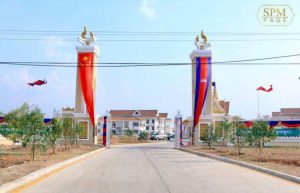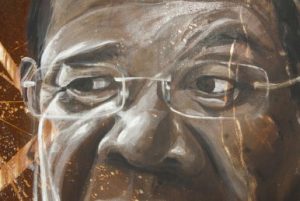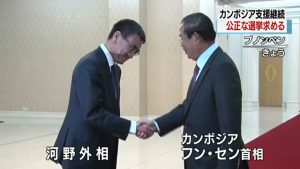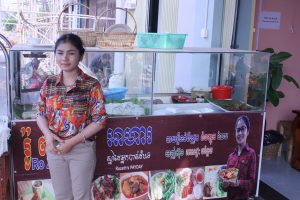Op-Ed: Phnom Penh Post
៣០ មេសា ២០១៨ / 30 April 2018
វិភាគសេដ្ឋកិច្ចពីវិនិយោគចិន នៅសកម្ពុជា / Chinese investments in Cambodia (*)
គេថាវិនិយោគចិន នៅប្រទេសកម្ពុជា ឈរលើកិច្ចសន្យា « ឈ្នះ ឈ្នះ » តែមានភាគីមួយទៀត ដែលទទួលការបង់ខាត គឺប្រជារាស្ត្រខ្មែរ
ថ្មីៗនេះ លោកនាយករដ្ឋមន្ត្រី ហ៊ុន សែន បានលើកតម្កើងវិនិយោគចិន នៅប្រទេសកម្ពុជា ថាមានប្រយោជន៍ធំធេងណាស់ សម្រាប់ស្រុកយើង។ តែខ្ញុំសូមធ្វើការកត់សម្គាល់ដូចតទៅ។

បញ្ហាចម្បង ទាក់ទងវិនិយោគចិន នៅប្រទេសកម្ពុជា គឺការខ្វះតម្លាភាព ដែលនាំមកនូវអំពើពុករលួយ ទាំងខាងភាគីវិនិយោគិនចិន ទាំងខាងភាគីមន្ត្រីជាន់ខ្ពស់រដ្ឋាភិបាល។ គេថាវិនិយោគទាំងនេះ ឈរលើកិច្ចសន្យា « ឈ្នះ ឈ្នះ » សម្រាប់ភាគីទាំងពីរ តែមានភាគីមួយទៀត ដែលទទួលការបង់ខាត គឺប្រជារាស្ត្រខ្មែរ ដែលមិនមានសិទ្ធិសម្តែងមតិ។
សព្វដង វិនិយោគពីបរទេស តែងតែផ្តល់ការងារឲ្យប្រជាពលរដ្ឋក្នុងស្រុក តែចំពោះវិនិយោគចិន នៅប្រទេសកម្ពុជាវិញ គ្មានផ្តល់ការងារអ្វី ឲ្យប្រជាពលរដ្ឋខ្មែរទេ ពីព្រោះវិនិយោគិនចិន គេនាំពលកររបស់គេ មកពីប្រទេសចិន ហើយប្រាក់ខែបើកឲ្យពលករបរទេសទាំងនោះ ត្រូវផ្ទេរទៅប្រទេសចិនវិញ។
សព្វដងទៀត មានការផ្ទេរបច្ចេកវិទ្យា ពីប្រទេសជឿនលឿន មកប្រទេសអន់ថយ តាមរយៈវិនិយោគ ពីប្រទេសមួយទៅប្រទេសមួយ តែចំពោះវិនិយោគចិន នៅកម្ពុជា គឺគ្មានការផ្ទេរបច្ចេកវិទ្យាអ្វីមកស្រុកយើងទេ ពីព្រោះពួកចិន គេធ្វើអ្វីៗទាំងអស់តែខ្លួនគេ ហើយគេនឹងវិលត្រឡប់ទៅស្រុកគេវិញ ក្រោយពីបញ្ចប់ការដ្ឋានរបស់គេនៅស្រុកយើង។
ពេលដែលពលករទាំងអស់ ត្រូវបាននាំមកពីប្រទេសចិន ពលករខ្មែរ មិនមានឱកាសទទួលបានការបណ្តុះបណ្តាលវិជ្ជាជីវៈអ្វីទេ ហើយស្រុកយើងក៏គ្មានឱកាសអភិវឌ្ឍធនធានមនុស្សរបស់យើងឡើយ។ លោក ហ៊ុន សែន លើកឡើងថា វិនិយោគិនចិន ត្រូវតែនាំពលកររបស់គេ ពីស្រុកចិនមកប្រទេសកម្ពុជា ពីព្រោះស្រុកយើងខ្វះធនធានមនុស្ស ហើយមិនអាចរកពលករមានជំនាញវិជ្ជាជីវៈបានទេ។ ការលើកឡើងរបស់លោក ហ៊ុន សែន បែបនេះ មានន័យថាគាត់ចង់ឲ្យប្រទេសកម្ពុជា នៅតែអន់ថយជាងគេជានិច្ចកាល ដោយស្ថិតក្នុងភាពល្ងង់ខ្លៅ ភាពក្រីក្រ និងភាពរំពឹងលើគេជានិច្ចកាល។
យើងកត់សម្គាល់ថែមទៀតថា ប្រទេសចិន ផ្តល់ជំនួយឲ្យយើងដៃម្ខាង តែដៃម្ខាងទៀតគេប្រមូលពីយើងវិញយ៉ាងសន្ធឹកសន្ធាប់ តាមរយៈសម្បទានដីធ្លី សម្បទានព្រៃឈើ និងសម្បទានរ៉ែ និងតាមរយៈកិច្ចសន្យាចំណេញកប់ក្តោង ដោយគ្មានហានិភ័យអ្វី ដោយសារមានការធានា មិនឲ្យបង់ខាត ពីរដ្ឋាភិបាលកម្ពុជា ដូចជាក្នុងវិស័យវារីអគ្គិសនី ជាដើម។
ចំពោះទេសចរណ៍ មកពីប្រទេសចិនវិញ ក៏គេមិនត្រូវការពលករ និងអាជីវករខ្មែរដែរ ពីព្រោះក្រុមហ៊ុនចិន ជាអ្នកចាត់ចែងអ្វីៗទាំងអស់ សម្រាប់ទេសចរណ៍ចិន ដែលមកទស្សនាប្រទេសកម្ពុជា។ ដូច្នេះ ប្រជារាស្ត្រខ្មែរ មិនចំណេញអ្វីពីទេសចរណ៍ចិនទេ ដែលមកស្រុកយើងភ្លូកទឹកភ្លូកដី តែប្រទេសកម្ពុជាទទួលការបង់ខាត ផ្នែកបរិស្ថាន និងសង្គម ដោយសារទេសចរណ៍បែបនេះ។
លោក ហ៊ុន សែន គាត់ត្រូវការការគាំទ្រពីប្រទេសចិន ដើម្បីជួយការពាររបបផ្តាច់ការ និងពុករលួយរបស់គាត់ ពីព្រោះប្រទេសចិន មិនគិតពីប្រជាធិបតេយ្យ សិទ្ធិមនុស្ស និងអភិបាលកិច្ចល្អទេ នៅស្រុកណាដែលគេមកវិនិយោគ។ តែចំពោះលោក ហ៊ុន សែន គាត់បង្ហាញពីកង្វះខាត ក្នុងការយល់ដឹងក្នុងវិស័យសេដ្ឋកិច្ច ហើយគាត់ក៏មិនអើពើ ពីផលប្រយោជន៍ប្រទេសកម្ពុជាឡើយ។
សម រង្ស៊ី
ប្រធានចលនាសង្គ្រោះជាតិ
(*) The Phnom Penh Post, 30 April 2018
Chinese investments in Cambodia are win-win-lose, and guess who’s the loser
By Sam Rainsy
Editor,
Following The Post’s article titled Hun Sen comes to China’s defence, praises investment and development aid (April 26), I would like to make the following remarks.
The main problem with Chinese investments is their complete lack of transparency, which favours corruption among both Chinese investors and Cambodian government officials. These investments generally consist of “win-win-lose” arrangements, with the Cambodian people being the silent loser.



